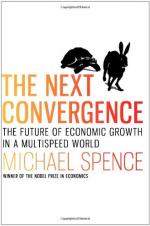|
This section contains 5,689 words (approx. 19 pages at 300 words per page) |

|
The idea that societies move toward a condition of similarity—that they converge in one or more respects—is a common feature of various theories of social change. The notion that differences among societies will decrease over time can be found in many works of eighteenth and nineteenth century social thinkers, from the prerevolutionary French philosophes and the Scottish moral philosophers through de Tocqueville, Toennies, Maine, Marx, Spencer, Weber, and Durkheim (Weinberg 1969; Baum 1974). More recently, the study of "postindustrial" society and the debate over "postmodernist" aspects of contemporary society also reflect to some degree the idea that there is a tendency for broadly similar conditions or attributes to emerge among otherwise distinct and dissimilar societies.
In sociological discourse since the 1960s, the term convergence theory has carried a more specific connotation, referring to the hypothesized link between economic development and concomitant changes in social organization, particularly...
|
This section contains 5,689 words (approx. 19 pages at 300 words per page) |

|


